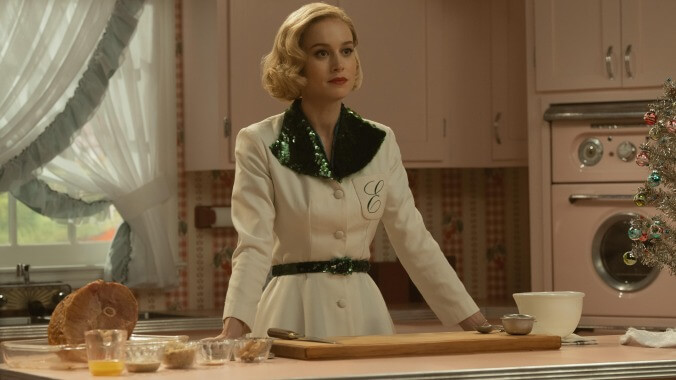Lessons In Chemistry review: Brie Larson leads a STEMinist fantasy
The Apple TV Plus series is beautiful and better plated than the book it's adapted from—but ultimately lacks spice

“Children, set the table. Your mother needs a moment to herself.”
This is the catchphrase of Lessons In Chemistry’s protagonist Elizabeth Zott, the one with which she ends each installment of her live afternoon cooking program Supper At 6, the show within this show. It functions as an invitation to her viewers to indulge and do as they please for a minute or two, but it also calls the real-life audience Apple TV+ now courts to do the same. Back when Lessons In Chemistry was but a best-selling book, this message held, too: Let down your guard, let go of guilt and any chick-lit shaming you may have internalized. Let yourself have this. And if that speaks to you, then you should go ahead and tune in when the series premieres on October 13.
It feels like a writerly concoction, this program’s premise: In the early 1960s, a brilliant but overlooked chemist stumbles into a position as a television cooking show host who uses her platform to teach housewives about science as well as their own worth. Think too much about it, and it falls apart like a big, crumbly muffin. It’s pure fantasy, which is what made it such a delicious confection for multitudes of beach-read enthusiasts in the first place. The villains of this story’s source material are two-dimensional ogre types, and each clearly deserves some kind of comeuppance; the heroine is progressive beyond her era and incomparably beautiful to boot. Throw in an anthropomorphized dog (his thoughts and self-doubts narrated), a precocious child, and a bit of mystery, and readers are especially eager to devour it. The crux of all of this remains intact in the televised adaptation, so it goes down with similar ease. But thankfully, for those of us not drawn to the perfectly valid and lucrative land of light literature, there are some important and well-considered pivots made here that give us a bit more to chew on than the book did. As goes another Zott catchphrase: “Let’s get started, shall we?”
The key romantic beats, and our heroine’s gains and losses, remain consistent with the literary version of this tale, and Brie Larson as Zott is well cast and more than equipped to play a social-justice-oriented scientific superhero/single mother. For people immediately turned off by the dog thing, that device dips in and out. (If Zott’s doggy pal Six Thirty—that’s his name—was a favorite part of the book, you might be delighted by that news.) If the idea of flat villains is an unwelcome one, we get a bit more nuance in these renderings than we did in the book. Zott’s adversaries don’t seem simply out to get her in this version, but generally hold some reasoning behind their positions beyond mere chauvinism. A TV executive character named Phil is the one who remains a bit of a caricature (the book version of this guy is a true monster), but he’s portrayed with the sort of childish entitlement and foul-mouthed fervor that makes it fun to watch as we root for him to go down.
 Keep scrolling for more great stories.
Keep scrolling for more great stories.
